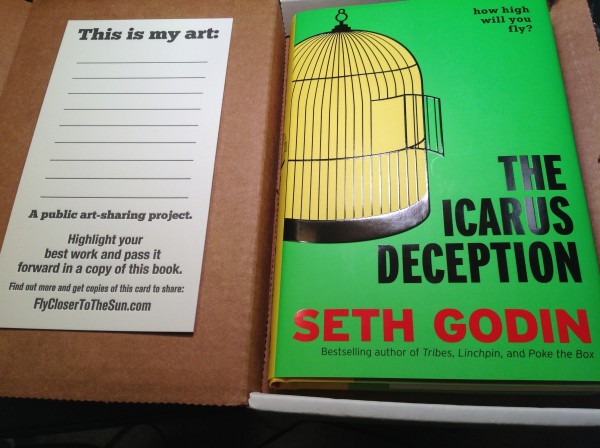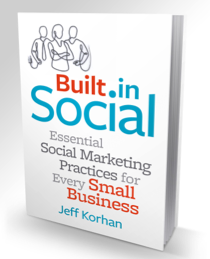
The process of doing what you were meant to do can be frightening, and that is why its accomplishment is so rewarding.
For one thing, you just may fail. In fact, honing your skills into a viable practice requires that you fail, because the perspective gained from failures and challenges leads to creating your best work.
Seth Godin calls the practice of delivering your best work creating your art.
You may not think of yourself as an artist, and that is largely because society has conditioned you to believe that greatness is what others accomplish – rock stars, accomplished athletes, and other celebrities.
Yet, each of us is a rock star in our own right when we face the fear of doing the work that we know we have to do. The Icarus Deception by Seth Godin is a new book that will show you how.
What you most fear is what you must accomplish.
Our fears are indications of what is important to us, what we deeply believe is within our capabilities for making a contribution to this world. This is precisely why your original contribution can be considered nothing less than art.
You Have Permission to Create Your Art
Working with the perspective of elevating your efforts to the level of art is something even those who are artists in a traditional sense can benefit from. Society conditions us to believe that success comes from learning to draw within the lines – that only leads to mediocrity.
The Icarus Decepton will change that by giving you permission to go where you need to go to do what you need to do. It encourages you to use your gifts to accomplish what no other is capable of, and therefore, what the world needs.
Seth defines art not as a product, but an attitude – one that leads to investing in things that give you a chance to stand out and make a difference. There is risk in that, which is why it works, and also why it involves facing fears.
From the moment you open the The Icarus Deception you realize this book is an example of its suggested methods. Accompanying it is a bookmark (see photo above) that is designed to encourage you take the risk of sharing your art – right now.
You are instructed to describe your art on the bookmark and then place it within another copy of The Icarus Deception at your local bookstore. Can you face the fear of taking the unorthodox act of sharing your art with complete strangers?
Me too.
Are You Ready to Accept the Gift?
I read portions of The Icarus Deception the past couple of weeks with no big breakthroughs. Then I picked it up yesterday after a particularly challenging presentation that nevertheless happened to go well.
This time it gave me a new perspective on success – that winning isn’t everything. I considered why I’ll often work hard to give my audiences what I think they want when I should instead be giving them what nobody else on this planet can offer them.
Instead of taking the traditional route, The Icarus Deception will indeed give you permission to find your best path, the one that will enable you to truly discover your work is art.
Most of us are waiting for others to give us permission when they buy us or hire us. That’s a product of conditioning – it’s how we were brought up, educated, and trained.
Instead of waiting, isn’t it better to just pick yourself? That’s how most successful businesses and projects start.
Following a traditional path can only lead to ordinary results that go unnoticed. Hard work is just not enough anymore, especially in an economy where most of us are already working harder than ever.
Instead of working hard just to impress the boss or customer, work to liberate your talent, expertise, and experience to elevate your work to art.
There has never been a better time to practice your art. Digital social media is increasingly connecting everyone on this planet, thereby providing abundant opportunities for the brave, creative, and relentless among us.
Does that describe you?
About the Author: Jeff Korhan, MBA, is the author of Built-In Social: Essential Social Marketing Practices for Every Small Business and host of This Old New Business podcast.
He helps mainstream businesses adapt their traditional growth practices to a digital world. Connect with Jeff on LinkedIn, Twitter, Facebook, and Google+



